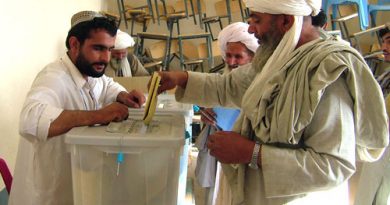Imagining Pan-Arabism Through the Lens of ‘Arab Idol’
By Gabrielle Hunt
Staff Writer
For the past six weeks that I have been studying in Jordan while living with a host family, I’ve come to enjoy a Saturday ritual that is common in the Arab world: gathering around the televsion to watch “Arab Idol,” the “American Idol” spinoff that first premiered in 2011. One Saturday night in particular was more exciting than most.
It’s February 25, the season finale, and my host family is jumping and cheering around the television; my host sister is even whistling. Yacoub Shaheen, a Palestinian Christian, has just been crowned the fourth winner of “Arab Idol.” For many — including my host family — his victory is about more than just winning a televised singing competition.
Yacoub Shaheen is now the second Palestinian to win “Arab Idol.” The first winner of Palestinian origin, Mohammed Assaf, won almost miraculously, as his participation in the competition was only made possible by escaping through tunnels from Gaza to make it to his audition. His win then led to an appointment as the first Palestinian goodwill ambassador for peace in the United Nations.

I first became familiar with Assaf’s story weeks prior at the opening of “No Refuge,” an exhibition by the Palestinian artist Khaled Hourani, held in Darat al-Funun, an art gallery in Amman’s art district, Jabal al-Webdeih. Hourani transformed Assaf’s story into a series of miniature figurines all in his likeness, titled “A Hundred Assafs.” Assaf is described by Hourani as one of the “fastest growing icons of Palestinian identity,” as his position as Arab-Idol-turned-humanitarian-ambassador has become a Palestinian triumph, transforming art into an opportunity for social change.
But as Hourani alludes to in “A Hundred Assafs,” the hardships of Palestinian life are hardly reflected by the brief and fleeting win of one Palestinian “Arab Idol.”
Hourani’s description of the sculptures ends with poignant questions: “How many Assafs do we need? Can Assaf bear all these responsibilities and expectations?”
As Shaheen, the Palestinian Christian, accepted his win by singing with the Palestinian flag draped around his shoulders — a flag whose colors were once banned from public display — I could feel that his win was a symbolic assertion of Palestinian existence and identity. But I also know that no victory can solve the very real burdens and hardships many Palestinians face every day. As I reflected on the hundreds of singing Mohammed Assafs in the gallery, juxtaposed with the scene of Yacoub Shaheen crying and singing, “My blood is Palestinian,” in Arabic, I could only wonder, “How many Shaheens do we need?”
In addition to Shaheen’s Palestinian origin, my host family was especially excited about having a Christian winner. “Before the Gulf War, no one cared if you were Muslim or Christian,” my host mom explained to me. Her hope is that Shaheen’s win is indicative of the Arab world moving in a more pluralistic and unified direction less focused on religious identity. “Christians and Muslims are becoming equal again,” she said.
But beyond Shaheen’s – or even Assaf’s – identities, what was most striking about the “Arab Idol” finale was the solidarity among the final three competitors. At times, it was unclear who the winner was, as each finalist (two Palestinians and one Yemeni) took turns singing with their respective flags draped around their shoulders.
In Middle Eastern studies, we often speak about the crests and troughs of the elusive — if not mythological — concept of Pan-Arabism. I won’t conclude or theorize on the validity of this notion, but I will say this: Watching my Jordanian family cheer on the win of a Palestinian and empathize with the tears of a Yemeni, and seeing the televised audience of different identities and origins dancing together in Lebanon made me think that perhaps Pan-Arabism is real — even if it exists, for now, in the realm of “Arab Idol.”


